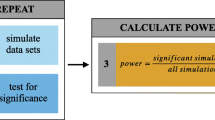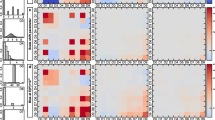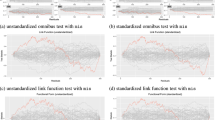Abstract
We provide applications of the generalized likelihood ratio (GLR) method proposed in Peng et al. (2016c) to distribution sensitivity estimation for both finite-horizon and steady-state simulation. Applications on sensitivity of distortion risk measure, gradient-based maximum likelihood estimation, and quantile sensitivity in both finite-horizon and steady-state settings are put together under a single umbrella, and addressed uniformly by the proposed estimator. Empirical comparison of the performance of different methods is presented.

Similar content being viewed by others
References
Austin P, Schull M (2003) Quantile regression: a statistic tool for out-of-hospital research. Acad Emerg Med 10(7):789–797
Boyle P, Broadie M, Glasserman P (1997) Monte Carlo methods for security pricing. J Econ Dyn Control 21(8):1267–1321
Broadie M, Glasserman P (1996) Estimating security price derivatives using simulation. Manag Sci 42(2):269–285
Cao X-R (1994) Realization probabilities: The dynamics of queueing systems. Spinger-Verlag, New York
Cao X-R (2007) Stochastic learning and optimization: a sensitivity-based approach. Springer Science & Business Media
Cao X-R, Wan X (forthcoming) Sensitivity analysis of nonlinear behavior with distorted probability. Mathematical Finance.
Cassandras CG, Lafortune S (2008) Introduction to discrete event systems. Springer Science & Business Media
Chen N, Glasserman P (2007) Malliavin Greeks without Malliavin calculus. Stoch Process Appl 117(11):1689–1723
Chen N, Liu Y (2014) American option sensitivities estimation via a generalized infinitesimal perturbation analysis approach. Oper Res 62(3):616–632
Crane MA, Iglehart DL (1975) Simulating stable stochastic system, III: Regenerative processes and discrete event simulations. Oper Res 23:33–45
Fournié E, Lasry J-M, Lebuchoux J, Lions P-L, Touzi N (1999) Applications of Malliavin calculus to Monte Carlo methods in finance. Finance Stochast 3(4):391–412
Fu MC (2006) Gradient estimation. In: Henderson SG, Nelson BL (eds) Chapter 19 in Handbooks in Operations Research and Management Science, vol 13. Elsevier, pp 575–616
Fu MC (2008) What you should know about simulation and derivatives. Nav Res Logist 55(8):723–736
Fu MC (2015) Stochastic gradient estimation. In: Fu MC (ed) Chapter 5 in handbooks of simulation optimization, vol 216. Springer, pp 105–147
Fu MC, Hong LJ, Hu J-Q (2009) Conditional Monte Carlo estimation of quantile sensitivities. Manag Sci 55(12):2019–2027
Fu MC, Hu J-Q (1995) Sensitivity analysis for Monte Carlo simulation of option pricing. Prob Eng Informational Sci 9(03):417–446
Fu MC, Hu J-Q (1997) Conditional monte carlo: Gradient estimation and optimizaiton applications. Kluwer Academic Publishers, Boston
Fu MC, Hu J-Q, Nagi R (1995) Comparison of gradient estimation techniques for queues with non-inentical servers. Comput Oper Res 22(7):715–729
Glasserman P (1991) Gradient estimation via perturbation analysis. Kluwer Academic Publishers, Boston
Glasserman P (2004) Monte Carlo methods in financial engineering. Springer
Glynn PW (1990) Likelihood ratio gradient estimation for stochastic systems. Commun ACM 33(10):75–84
Gong WB, Ho Y-C (1987) Smoothed (conditional) perturbation analysis of discrete event dynamic-systems. IEEE Trans Autom Control 32(10):858–866
Heidergott B (2001) Option pricing via Monte Carlo simulation. Prob Eng Informational Sci 15(03):335–349
Heidergott B, Hordijk A (2004) Single-run gradient estimation via measure-valued differentiation. IEEE Trans Autom Control 49(10):1843–1846
Heidergott B, Hordijk A, Weisshaupt H (2006) Measure-valued differentiation for stationary Markov chains. Math Oper Res 31(1):154–172
Heidergott B, Volk-Makarewicz W (2016) A measure-valued differentiation approach to sensitivity analysis of quantiles. Math Oper Res 41(1):293–317
Heidergott B, Volk-Makarewicz W, Vázquez-Abad F (2010) Gradient estimation for quantiles of stationary waiting times. IFAC Proc Vol 43(12):241–246
Ho Y-C, Cao X-R (1991) Discrete event dynamic systems and perturbation analysis kluwer academic publishers. MA, Boston
Ho Y-C, Cao X-R, Cassandras C (1983) Infinitesimal and finite perturbation analysis of discrete event dynamic systems. Automatica 19(4):439–445
Ho Y-C, Cassandras C (1983) A new approach to the analysis of discrete event dynamic systems. Automatica 19(2):149–167
Hong LJ (2009) Estimating quantile sensitivities. Oper Res 57(1):118–130
Hong LJ, Liu G (2009) Simulating sensitivities of conditional value at risk. Manag Sci 55(2):281–293
Hong LJ, Liu G (2010) Pathwise estimation of probability sensitivities through terminating or steady-state simulations. Oper Res 58(2):357–370
Jiang G, Fu MC (2015) Technical note — On estimating quantile sensitivities via infinitesimal perturbation analysis. Oper Res 63(2):435–441
Jorion P (2001) Value at risk. Wiley
L’Ecuyer P (1990) A unified view of the IPA, SF, and LR gradient estimation techniques. Manag Sci 36(11):1364–1383
Lei L, Hu J-Q, Fu MC (2016) Quantile sensitivity estimation for regenerative processes. working paper
Liu G, Hong LJ (2009) Kernel estimation of quantile sensitivities. Nav Res Logist 56(6):511–525
Peng Y, Fu MC, Hu J-Q (2014) Gradient-based simulated maximum likelihood estimation for Lévy-driven Ornstein-Uhlenbeck stochastic volatility models. Quant Finan 14(8):1399–1414
Peng Y, Fu MC, Glynn PW, Hu JQ (2017) On the asymptotic analysis of quantile sensitivity estimation by monte carlo simulation. Submitted to Winter Simulation Conference
Peng Y, Fu MC, Hu J-Q (2016a) Gradient-based simulated maximum likelihood estimation for stochastic volatility models using characteristic functions. Quantitative Finance
Peng Y, Fu MC, Hu J-Q (2016b) Sensitivity analysis of distorted risk measure by Monte Carlo simulation. working paper
Peng Y, Fu MC, Hu J-Q, Heidergott B (2016c) A new unbiased stochastic derivative estimator for discontinuous sample performances with structural parameters. submitted to Operations Research
Pflug G (1988) Derivatives of probability measures - concepts and applications to the optimization of stochastic systems. Lect Notes Control Inf Sci 103:252–274
Pflug G (1989) Sampling derivative of probabilities. Computing 42:315–328
Rubinstein RY, Shapiro A (1993) Discrete event systems: Sensitivity analysis and stochastic optimization by the score function method. Wiley, New York
Rudin W (1964) Principles of mathematical analysis. McGraw-Hill Education, New York
Vázquez-Abad F, Kushner H (1992) Estimation of the derivative of a stationary measure with respect to a control parameter. J Appl Probab 29(2):343–352
Wang Y, Fu MC, Marcus SI (2012) A new stochastic derivative estimator for discontinuous payoff functions with application to financial derivatives. Oper Res 60 (2):447–460
Acknowledgments
This work was supported in part by the National Science Foundation (NSF) under Grants CMMI-1362303 and CMMI-1434419, by the National Natural Science Foundation of China (NSFC) under Grants 71571048 and 71071040, by the Air Force of Scientific Research (AFOSR) under Grant FA9550-15-10050, by the Science and Technology Agency of Sichuan Province under Grant 2014GZX0002, by the Program for Professor of Special Appointment (Eastern Scholar) at Shanghai Institution of Higher Learning, and by the China Postdoctoral Science Foundation under Grant 2015M571495.
Author information
Authors and Affiliations
Corresponding author
Additional information
This article belongs to the Topical Collection: Special Issue on Performance Analysis and Optimization of Discrete Event Systems
Guest Editors: Christos G. Cassandras and Alessandro Giua
Rights and permissions
About this article
Cite this article
Lei, L., Peng, Y., Fu, M.C. et al. Applications of generalized likelihood ratio method to distribution sensitivities and steady-state simulation. Discrete Event Dyn Syst 28, 109–125 (2018). https://doi.org/10.1007/s10626-017-0247-8
Received:
Accepted:
Published:
Issue Date:
DOI: https://doi.org/10.1007/s10626-017-0247-8




